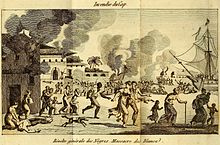
The Haitian Revolution and the subsequent independence of Haiti as an independent state provoked mixed reactions in the United States. Among many white Americans, this led to uneasiness, instilling fears of racial instability on its own soil and possible problems with foreign relations and trade between the two countries. Among enslaved black Americans, it fueled hope that the principles of the recent American Revolution might be realized in their own liberation. While the Haitian Revolution was occurring during the presidencies of George Washington and John Adams, members of the Federalist Party including Alexander Hamilton supported Toussaint Louverture and his revolution. John Adams appointed Edward Stevens as US consul-general to Haiti to forge a closer relationship between the two nations and express US support for Louverture's government.
Alexander Hamilton assisted in drafting the constitution of Haiti and he advocated for closer diplomatic and economic relations between Haiti and the United States. The U.S. started to become less diplomatic to Haiti under the presidency of Thomas Jefferson. Thomas Jefferson recognized that the revolution had the potential to cause an upheaval against slavery in the US not only by slaves, but by white abolitionists as well. Southern slaveholders feared the revolt might spread from the island of Hispaniola to their own plantations. Against this background and with the declared primary goal of maintaining social order in Haiti, the US, refused acknowledgement of Haitian independence until 1862.
The US also embargoed trade with the nascent state. American merchants had conducted a substantial trade with the plantations on Hispaniola throughout the 18th century, the French-ruled territory providing nearly all of its sugar and coffee. However, once the Haitian slave population emancipated itself, the US was reluctant to continue trade for fear of upsetting the evicted French on one hand and its Southern slaveholders on the other. Despite this, there were anti-slavery advocates in northern cities who believed that consistency with the principles of the American Revolution — life, liberty and equality for all — demanded that the US support the Haitian people. One outcome of the Haitian Revolution for the United States of America was the Louisiana Purchase. Having lost his control of the Caribbean landholding, Napoleon saw no further use for Louisiana. The US was only interested in the New Orleans area; however, the revolution enabled the sale of the entire territory west of the Mississippi River for around $15 million. This purchase more than doubled US territory.[1][2][3][4][5]
- ^ Matthewson, Timothy M. (1979). "George Washington's Policy Toward the Haitian Revolution*". Diplomatic History. 3 (3): 321–336. doi:10.1111/j.1467-7709.1979.tb00318.x.
- ^ Calvin, Matthew, J (2010). Toussaint Louverture and the American Civil War: The Promise and Peril of a Second Haitian Revolution. University of Pennsylvania Press, 2010. ISBN 9780812242058.
{{cite book}}: CS1 maint: multiple names: authors list (link) - ^ Popkin, Jeremy, D (2012). A Concise History of the Haitian Revolution. John Wiley & Sons, 2012. ISBN 9781405198202.
{{cite book}}: CS1 maint: multiple names: authors list (link) - ^ Dubois, Laurent. "Two Revolutions In The Atlantic World: Connections Between The American Revolution and The Haitian Revolution". Gilder Lehrman. The Gilder Lehrman Institute of American History. Retrieved 16 July 2017.
- ^ Cite error: The named reference
haitiasantiwhitewas invoked but never defined (see the help page).